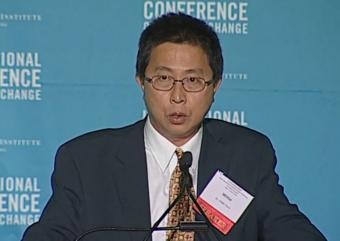More than 500 scientists and colleagues of Willie Soon, Ph.D., signed and sent a letter, along with supporting documents, to the Smithsonian Institution’s Board of Regents.
The letter and supporting materials defend the award-winning solar physicist against allegations he failed to disclose conflicts of interest in publications critics say require such acknowledgments.
The letter notes Soon, a researcher for a quarter of a century at the Smithsonian Astrophysical Observatory, part of the Harvard-Smithsonian Center for Astrophysics, has always strictly followed Harvard-Smithsonian’s conflict of interest guidelines.
The letter was written by Lord Christopher Monckton, David Legates, Ph.D., and statistician William Briggs, Ph.D., all of whom coauthored with Soon an important study in Science Bulletin, a publication of the Chinese Academy of Sciences. The study showed a simple climate model, without the feedbacks built into complex models used by the Intergovernmental Panel on Climate Change, better tracks temperature trends than the complex models. The Science Bulletin article proved highly popular, resulting in more downloads than any other article in the journal’s history and receiving significant media coverage.
Attacking the Scientist
A month after the Science Bulletin study was published, the Boston Globe, The New York Times, and other newspapers published many-years-old allegations provided by a Greenpeace staffer claiming Soon failed to disclose his research was funded by fossil-fuel companies. Responding to the media coverage, Smithsonian announced it would investigate Soon for allegedly improperly failing to disclose a source of his funding for his work on the paper.
University of Pennsylvania professor J. Scott Armstrong, a signer of the letter, said of the reports accusing Soon of conflict of interest, “Ad hominem arguments are contrary to the scientific method. One should never accuse scientists of being unethical in their research. Accusations do not help advance knowledge; they mislead readers about the proper way to examine a study, damage the reputations of those accused, and waste time for many people.”
“Errors are common in science and there are proper procedures for eliminating them: Replicate the study and publish the findings,” Armstrong said. “Nothing else is needed.”
Soon Vindicated
A detailed examination of the claims against Soon by Robert Carter, Ph.D., revealed no investigation of Soon was warranted. The Smithsonian had negotiated all the contracts in question under the condition the funder’s identity was not to be published, and all the money went directly to the Smithsonian, which paid Soon out of the grants.
Smithsonian’s internal policies ensured there would be no conflict of interest, Carter found. As the letter sent to Smithsonian’s Board of Regents states, “The only papers in which Soon had not disclosed his funders’ identity were those papers covered by that contractual obligation of confidentiality, for which obligation the Smithsonian, not Soon, was entirely responsible.”
Legates, a University of Delaware climatologist, says Soon’s efforts to maintain his research’s independence has placed him in an untenable position.
“Dr. Soon has been placed in a Catch-22,” Legates said. “The Harvard-Smithsonian Center for Astrophysics signed contracts with funders carrying the stipulation that their name was only to be used if the funding organization approved of the final product.
“If Dr. Soon had disclosed the funding source on his research papers, the funder would have had to approve of the paper and what it says before publication,” Legates said. “Dr. Soon chose to keep his research free from potential censorship by the funder and not to violate the contract signed by the Harvard-Smithsonian Center. Thus he could not include the source of funding in his papers.”
By Smithsonian’s Charter, the sitting chief justice of the U.S. Supreme Court is an ex officio member of organization’s Board of Regents. The letter requests Chief Justice John Roberts to begin independent investigations into Smithsonian’s possible malfeasance.
A report detailing Soon’s history with the Smithsonian, the recent controversy, and Smithsonian’s response accompanied the letter. If any investigations find the report to be correct, the letter requests Roberts to “order the Smithsonian to apologize publicly to Dr. Soon and to make just and full restitution to him for the loss and damage it and its senior management have intentionally caused.”
H. Sterling Burnett ([email protected]) is managing editor of Environment & Climate News.
Internet Info
Lord Christopher Monckton, David Legates, William Briggs, “Petition to Harvard-Smithsonian in Defense of Willie Soon,” May 5, 2015: https://heartland.org/policy-documents/recent-misconduct-senior-managers-harvard-smithsonian-center-astrophysics
Robert M. Carter, “A Statement Regarding Allegations Concerning Dr. Willie Soon,” March 3, 2015: https://heartland.org/policy-documents/statement-regarding-allegations-concerning-dr-willie-soon





